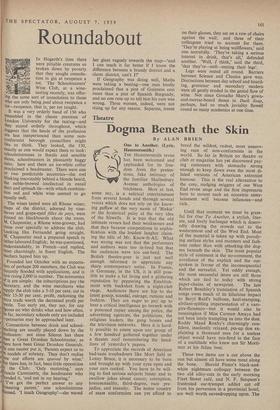Roundabout
IN Hogarth's time there were pitiable creatures so broken down by poverty that they sought consola- tion in gin at twopence a tot. The Schoolmasters' Wine Club, at a wine- tasting recently, was offer- ing the same sort of consolation to those Who are only being paid about twopence a tot—twopence, that is, per tot taught.
It was a very orderly band of 150 who assembled in the chaste premises of London University for the tasting—and they stayed orderly throughout, which suggests that the heads of the profession are less inexperienced than some non- conformist borough councillors might like to think. They looked, the 150, exactly as one would expect them to look: schoolmistresses in florals and sensible Shoes, schoolmasters in pleasantly baggy suits; here and there an ice-white collar Proclaimed a headmaster. There were one or two predictable eccentrics—the owl blinking inscrutably behind a blonde beard, the noble-browed intellectual in oxtail Shirt and spinach tie—with which combina- tion red and white wine seemed to go equally well.
The wines tasted were all Rhone wines; laps of the district, adorned by vine- leaves and grape-eyed filles du pays, were Pinned on blackboards about the room. M. Chapoutier, a Rhone wine-grower, had come over specially to address the club. Looking like Fernandel going straight, M. Chapoutier read a prepared speech in rather laboured English; he was questioned, Understandably, in French—and replied, hlost charmingly, in fluent English. The leachers lapped him up.
Founded last October with an expecta- tion of perhaps 200 members, the Club was nstantly flooded with applications, and is how rising 2,000 in number. The economics Of it are simple: the subscriptions pay the Secretary, and the wine merchants who sUpply the club take a 5-10 per cent. cut in their 15-30 per cent. profit, reckoning the rxtra trade worth the decreased profit per bottle. Too early yet, they say, for any 3 '4gures on who drinks what and how often. 1 '43 far, secondary schools only are included '-primaries may be approached later.
Connections between drink and school-
'caching are usually played down by the r O,r ofession: not since Silenus has there
seen a Great Drunken Schoolmaster, as
there have been Great Drunken Generals.
,ks one master put it, Parents expect us to ,5e models of sobriety. They don't realise IOW our efforts are spurred by wine.' Ilut there has, in fact, been little opposition I° the Club: 'Only muttering,' says rancis Cammaerts, the headmaster who
unded it, 'and not in my hearing.'
'I've got the perfect answer to any otesting parent,' one schoolmistress med. 'I teach Geography'—she waved her glass vaguely towards the map—'and I can teach it far better if I know the difference between a brandy district and a claret district, can't I?'
If Geography was doing well, Maths were taking a beating—one man loudly proclaimed that a pint of Guinness cost more than a pint of Spanish Burgundy, and no one rose up to tell him his sum was wrong. Three women, indeed, were not rising up for any reason. Separate, intent on their glasses, they sat on a row of chairs against the wall; and three of their colleagues tried to account for them. 'They're playing at being wallflowers,' said one scornfully. 'They're taking a serious interest in drink, that's all,' defended another. 'Well, / think,' said the third, 'that they're—well—resting their legs'.
Legs were rested all round. Barriers between Science and Classics gave way. Distinctions between day school and board- ing, grammar and secondary modern were all gently eroded in the genial flow of wine. Not since Groucho Marx's gown- and-mortar-board dance in Duck Soup, perhaps, had so much joviality flowed round so many academics at one time.


























 Previous page
Previous page